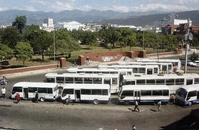NTCS pays its debt - Fighting for new transport deal
Published: Sunday | October 11, 2009

Both JUTC and NCTS buses are seen parked inside the downtown Kingston terminus awaiting commuters.- File
Jamaica's plan for a more cohesive, and orderly, transport service within the Kingston metro region gets into gear November 2, when its partnership with the National Transport Cooperative Society (NTCS) ends and all routes are put back under the direct control of state bus service Jamaica Urban Transit Company (JUTC).
Cabinet pulled the plug on the 14-year-old NTCS earlier this year and ordered the Ezroy Millwood-led cooperative to wind down operations by the November deadline, to cauterise expanding unpaid licensing fees that reportedly hit $12 million last year, and to regain control of the entire transport system within the Kingston Metropolitan Transport Region (KMTR) while negotiating payment of the fees.
done all they asked
Millwood now says the NCTS has made good on the debt.
"We have paid the amount to satisfy the Government," he told The Sunday Gleaner on Monday, producing a letter of acknowledgement from the transport ministry signed by the senior legal officer.
"We have done all they asked," he said.
But that payment is just for the 2008 period, a fact that Millwood acknowledges.
"We have paid nothing for 2009. The Government is only saying that we owe, but has not stated an amount, and so we can't pay anything until we know for sure what they are asking for."
The Sunday Gleaner, too, was unable to ascertain the size of the outstanding 2009 payments.
The Government's decision to cease doing business with the NCTS as a body could effectively kill the cooperative, but the transport ministry has said it may end up still doing business with individual bus owners through the JUTC.
The private bus owners have already telegraphed intentions to seek operating licences for KMTR routes, including Spanish Town, Portmore, Maxfield Avenue, Waltham Park Road and Jones Town.
plan remains
In a report earlier this year, JUTC spokesman Reginald Allen stated that the more than 150 bus owners, now being represented by the NTCS, will be considered once their current agreement ends, whether as a group or as individuals.
That plan remains.
"Dialogue will be held with everyone, even those who are illegal who have a desire to legitimise their business," Allen said Monday.
"As long as they meet the criteria of the quality service that we desire for our commuters, they will be considered." The JUTC is yet to say what the qualifying criteria will be, but Allen confirmed that the Transport Authority (TA) will review applicants in consultation with the JUTC, while indicating that a great deal would ride on a bus operator's history with the authority.
Indeed, notwithstanding attempts at damage control by Millwood, NTCS operators have a reputation for dangerous driving, overloaded buses, loud music and rowdy crews.
Millwood, as boss of the NTCS and a bus owner, has had a long-standing run-in with the government spanning more than a decade.
The embattled NTCS boss says his organisation will be applying for routes under the new policy, claiming that more than 90 per cent of the operators of the cooperative's 164-bus fleet have expressed confidence in his leadership.
"Our standards have dropped, but we are able, set and prepared to meet any standard set by the policymakers," he said.
full compliance
In order to ensure full compliance under the new system, the JUTC limited the current subfranchise agreement with the NTCS to six months, which means that all the operators must seek further legitimacy and strike new deals during the implementation of the revised transport structure.
The initial plan was to implement the new system in tandem with the new mandatory colour-coding system for public transportation, which Government is banking on to weed out some 12,000 illegal operators and exercise a greater level of control over the system.
Were the state to drive out the illegal operators, it would drive down competition for the loss-making JUTC, whose roadworthiness is dependent on yearly government subsidies on operations to develop its fleet.
The last set of 100 buses bought from Jonckheere of Belgium were painted yellow in keeping with the policy of colour coding. Another 200 buses are due from Belgium next year.
While it is still unclear how Government will fund this project, given that legitimate private-transport operators will also have to conform to it, the colour-code system is set to be launched in Montego Bay by the end of 2009, then gradually rolled out nationwide.
Different colours are to be assigned to different transport zones.
mark.titus@gleanerjm.com















